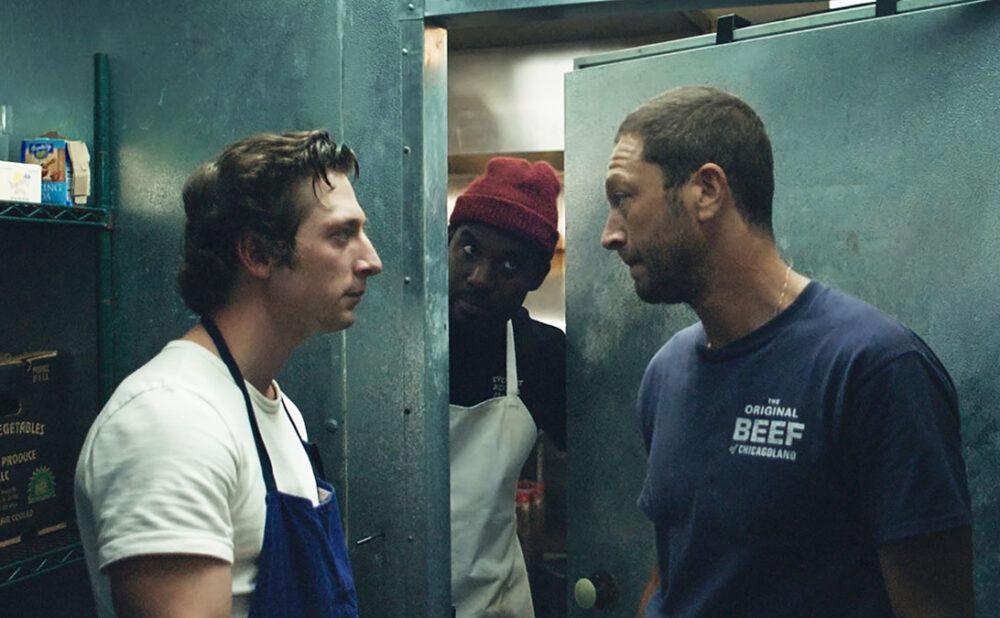The Bear star Richard “Richie” Jerimovich in The Bear promises more mayhem on menu
Restaurants are “like an addiction” to the cousins in last year’s break-out hit The Bear says “Richie”, actor Ebon Moss-Bachrach

Jeremy Allen White as Carmen 'Carmy' Berzatto and Ebon Moss-Bachrach as The Bear star Richard “Richie” Jerimovich in The Bear. Courtesy of DISNEY+
Where: Disney+
What: Series, season 2, 10 episodes
When: sometime this summer,
Canada: June 22, U.S.
Genre: Drama
Why you should watch: Sleeper hit from last year delivers an unflinching look at life in a struggling big-city restaurant, including a powerful portrayal of the complicated relationship between two male cousins running the place.
Actor Ebon Moss-Bachrach, known for roles as the anti-hero in The Punisher and the boyfriend on Girls, had roles on two very different hit shows in 2022: the big-budget Andor and the year’s small production sleeper hit The Bear.
He plays troubled rebel Avril Skeen on the mega-budget Andor; and he is the rage-powered cousin, Richard “Richie” Jerimovich on The Bear, the perfect counterpoint to his calm and concerned master chef cousin, Carmen “Carmy” Berzatto (Jeremy Allen White) as the two try to operate a failing business.
“One is like a tiny little moped and the other one is like a glacier,” says Moss-Bachrach of his two shows from his Brooklyn home on a Zoom call earlier this year. “It’s wild they’re even considered the same kind of thing. They couldn’t be more different from each other.”
He says they shot the entire season of The Bear while he was on a break from shooting Andor.
With its mostly single set and a limited, recurring cast, I suggest The Bear is almost like making a play in contrast to the massive Star Wars undertaking.
“It does feel like a play. A play is more about the acting; on The Bear, so much is created just on the set between the actors. I like to do plays because nobody can cut you or do anything to your work; this feels very similar.”
Moss-Bachrach raves about the show’s writers and says actors receive scripts weeks in advance, unlike many series where you can receive scripts on the set.
“We get scripts weeks, even a month before we show up in Chicago, which is a real luxury.” He says actors discuss scenes before shooting begins, allowing them to refine the work.
“It goes very, very quickly. We shoot many, many pages a day; we don’t do many takes.”
He thinks the pace and energy with which they make the show re ect life in a restaurant and comes through to the audience.
I note The Bear captures the shared energy of teammates.
“Or a platoon,” says Moss- Bachrach.” It’s crazy and adrenal and messy, and then they come out of it and everyone feels relieved and it’s miraculous that they made it through. They get a little bit of sleep and then go back and do it all over again. Those metaphors make a lot of sense to me.”
I ask Moss-Bachrach — who’s never worked in a restaurant, isn’t from Chicago and seems like a nice guy — how he summons Richie’s latent rage.
“Latent rage doesn’t just exist in Chicago, it’s an international phenomenon,” he says.” Without going too much into the weeds, I think that rage comes out of grief and loss and confusion and feelings of self-loathing and not knowing where you fit in. I think that’s pretty human and probably inevitable for people to feel at some point in their life.
“I worry for him,” he says of his Screens character. “It’s kind of that thing where you speak so loudly to fill the silence so you don’t have to deal with anything. Like, take all the mirrors down in your house.”
For all the shouting and anger that Richie carries on the show, Moss- Bachrach has a number of profoundly moving and affecting scenes where he doesn’t talk at all.
“A lot of people don’t have much sympathy for Richie, but I don’t think he’d have any sympathy if it wasn’t for those quiet moments to punctuate the other stuff.”
And what of season two?
“You saw what it was: they found money where they could have paid back their loan and, instead, they’re going to double down and try to make a pretty ambitious restaurant. It’s like an addiction; it’s not the healthy decision, but it’s definitely the decision to make if you want to make another season of television that’s interesting and dramatic,” laughs Moss-Bachrach. “But it’s probably the worst thing they could possibly do.”







